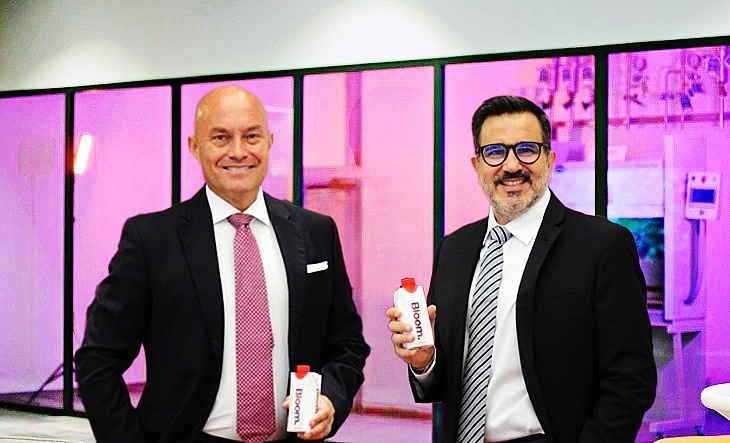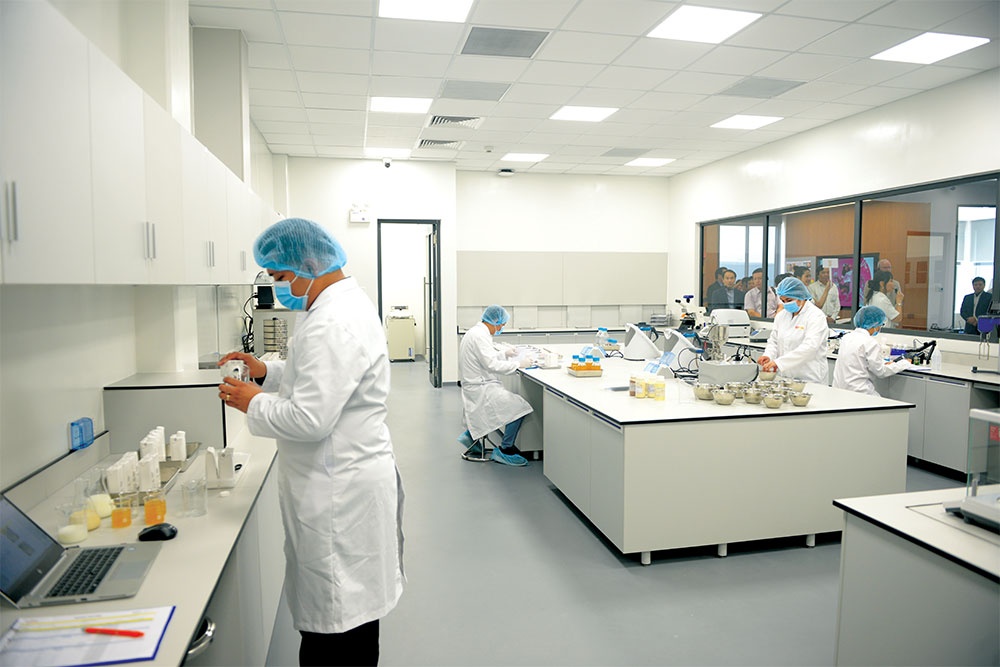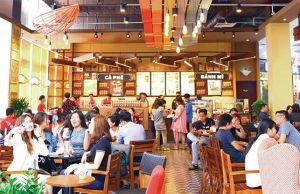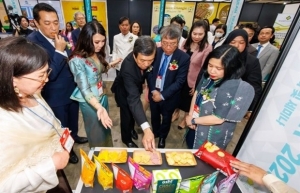Pioneering advances in Vietnamese F&B
 |
| Eliseo Barcas (left), managing director of Tetra Pak Vietnam, and CEO of DenEast Vietnam Johan Boden (right) |
Can you explain what Bloom. is, and have you ever developed this model in other countries before?
Barcas: It is an innovation platform, designed by Tetra Pak in collaboration with DenEast, a contract manufacturing service provider.
This platform, which has been planned for 18 months, is all about delivering cost-efficient innovation to the market through some remarkable features, like incubating and accelerating new concepts with product development best practices.
If you can’t come to the physical centre for the trial of new products, we even offer remote trials.
Plus, you’ll have access to flexible and advanced technology, and can scale from trials to production thanks to DenEast’s food licence. One of the key benefits is that brand owners won’t even need to invest in capital equipment.
Within Tetra Pak, we have 11 other product development centres around the world. However, this is the first time we’re establishing a product development centre with capabilities to produce in massive production. What differentiates this centre is its collaboration with dedicated contract manufacturers. We can now experience development and scale up in massive production from small to large-size brands.
What will business owners need to bring to Bloom? Can you describe what journey businesses will go through to create a new beverage product with Bloom?
Barcas: All we need initially is your idea and vision of what you want to achieve with the product.
We believe that every great product begins with a vision. Your vision, partnered with our resources, leads us on a journey of innovation, beginning at the conception of your idea and culminating in its full-scale production.
We can start by exploring your ideas and identifying potential opportunities and challenges for introducing that product to market, leveraging on our extensive market insights.
After that, our team will work with you to refine your ideas or generate new ones that are aligned with the finding and your vision. Then we create a prototype of the product to assess its functionality and feasibility before validating it through trials among focus groups.
Once the prototype is validated, we start the brand design to ensure that the new product will look appealing to its target consumers.
Next, we will help you create the product in small batches and measure its performance through consumer feedback.
Finally, if the small batch is a success, we can support formulating a tailored strategy to facilitate the transition from small-scale production to mid-large and mass production.
 |
Could you illuminate the distinctiveness of the integrated facility as compared to conventional setups?
Boden: Innovation today is typically a multi-step, multi-location process. Companies begin by developing a formulation, then move to another facility for small-batch production, and finally upscale in a larger facility for commercial trials. This method is both lengthy and fragmented.
To resolve this, we collaborated with Tetra Pak to develop a one-stop solution. The objective is to consolidate the product development process, allowing everything from ideas to market-ready products to occur under one roof.
Notably, we also handle crucial aspects such as securing food licences, processing permits, and establishing a robust quality management system – all integral parts of bringing a food product to consumers.
What led to Vietnam being chosen as the site for this innovation centre?
Barcas: Despite the recent challenges posed by global inflation, Vietnam shines as an attractive market with steady growth. By 2030, forecasts place the country in the top 10 biggest consumer markets in the world.
Vietnamese consumers exhibit increasing awareness towards health and environmental issues, demanding products that support their wellbeing while minimising environmental impact.
The liquid food sector in Vietnam has demonstrated steady growth, with a 3 per cent compound annual growth rate (CAGR) over the last three years. Furthermore, it’s projected to accelerate to a 6.1 per cent CAGR over the next three years, outpacing the global average by double.
Bloom. is ideally positioned to assist food and beverage (F&B) brands in launching new beverage products to meet the burgeoning demands of Vietnam’s 100 million consumers.
Given Vietnam’s strategic geographical positioning, it can effectively serve local brands and operate as a regional innovation hub for the industry.
What unique features does the innovation centre offer that distinguish it from others in the industry?
Boden: One standout characteristic is its ability to provide a comprehensive service under one roof, transforming mere ideas into tangible products. More importantly, we believe innovation transcends physical infrastructure and facilities; it’s fundamentally about people, their expertise, and experiences.
The centre is interconnected with all Tetra Pak development hubs worldwide, enabling us to tap into a global pool of competencies for efficient problem-solving. Furthermore, we’re committed to forming robust partnerships with industry leaders in ingredient sourcing and recipe development.
This approach allows us to establish a vast network capable of resolving queries from all angles and swiftly launching products in the market.
How will the centre impact the F&B industry commercially, and do you see it as a game changer?
Barcas: Certainly. We’re planning to use this innovation centre for all brands in Vietnam, from small to large-sized ones. Vietnamese F&B brands often recognise the need for innovative products to remain competitive, yet face distinct challenges.
For instance, smaller brands grapple with resource constraints and lack of expertise, while larger ones encounter production disruptions and lack dedicated facility for micro innovation. That’s why we are here to address all these problems and more, which indeed makes it a game changer equipped with Tetra Pak’s 70-year legacy in the food industry and DenEast’s robust manufacturing capabilities.
Our goal is to radically accelerate product creation cycles, potentially compressing timelines from years to mere months. This centre is primed to disrupt the industry, providing a cost-effective route to market for innovative products, benefitting brands and consumers alike.
How do you believe the platform can align with and support the Vietnamese government’s aspirations to shift towards an innovation-led economy?
Boden: The Vietnamese government’s vision of propelling the nation towards an innovation-centric economy is commendable. Our role is to facilitate this shift by focusing not merely on manufacturing, but moving up the value chain. This entails attracting and nurturing expertise, establishing global connections, and pioneering novel approaches.
Importantly, our strategy also places significant emphasis on sustainability. Vietnam aims to achieve net-zero carbon emissions by 2050, and that is a target we’re keen to support.
Through innovative measures such as solar power utilisation and a biomass team, we aim to demonstrate what Tetra Pak and DenEast are achieving in sustainability. We also intend to share our knowledge and expertise broadly because we believe that achieving these ambitious goals requires collaboration and open sharing of solutions.
Our team comprises highly skilled Vietnamese and international professionals, including food scientists, process specialists, and packaging experts. We’ve invested significant time in training our team, ensuring their proficiency with advanced technology and innovations.
Now, with our team poised to support F&B brands in their innovation journey, we’re ready to contribute to in Vietnam’s evolution into an innovation-based economy.
 | F&B mainstays taking digital direction Vietnam’s food and beverage sector is increasing cooperation with cashless payment solution providers to offer better customer service and accelerate such payments across the country. |
 | Foreign groups locking eyes on F&B Vietnam’s food and beverage sector is expected to see robust mergers and acquisitions amid the tough economic context. |
 | F&B groups snapping up new stores in bid for victory Consumer belt-tightening is not having much impact on the revenues of food and beverage businesses in Vietnam, with many maintaining stable growth rates. |
 | ASEAN, RoK boost business ties in food, beverage The ASEAN-Korea Centre (AKC) on May 30 opened an ASEAN Trade Fair in the framework of the Seoul Food 2023 (SF2003) to showcase food and beverage products from ASEAN countries and create opportunities for ASEAN companies to connect and establish business partnerships with partners from the Republic of Korea (RoK). |
What the stars mean:
★ Poor ★ ★ Promising ★★★ Good ★★★★ Very good ★★★★★ Exceptional
Related Contents
Latest News
More News
- Kurz Vietnam expands Gia Lai factory (February 27, 2026 | 16:37)
- SK Innovation-led consortium wins $2.3 billion LNG project in Nghe An (February 25, 2026 | 07:56)
- THACO opens $70 million manufacturing complex in Danang (February 25, 2026 | 07:54)
- Phu Quoc International Airport expansion approved to meet rising demand (February 24, 2026 | 10:00)
- Bac Giang International Logistics Centre faces land clearance barrier (February 24, 2026 | 08:00)
- Bright prospects abound in European investment (February 19, 2026 | 20:27)
- Internal strengths attest to commitment to progress (February 19, 2026 | 20:13)
- Vietnam, New Zealand seek level-up in ties (February 19, 2026 | 18:06)
- Untapped potential in relations with Indonesia (February 19, 2026 | 17:56)
- German strengths match Vietnamese aspirations (February 19, 2026 | 17:40)

 Tag:
Tag:




















 Mobile Version
Mobile Version